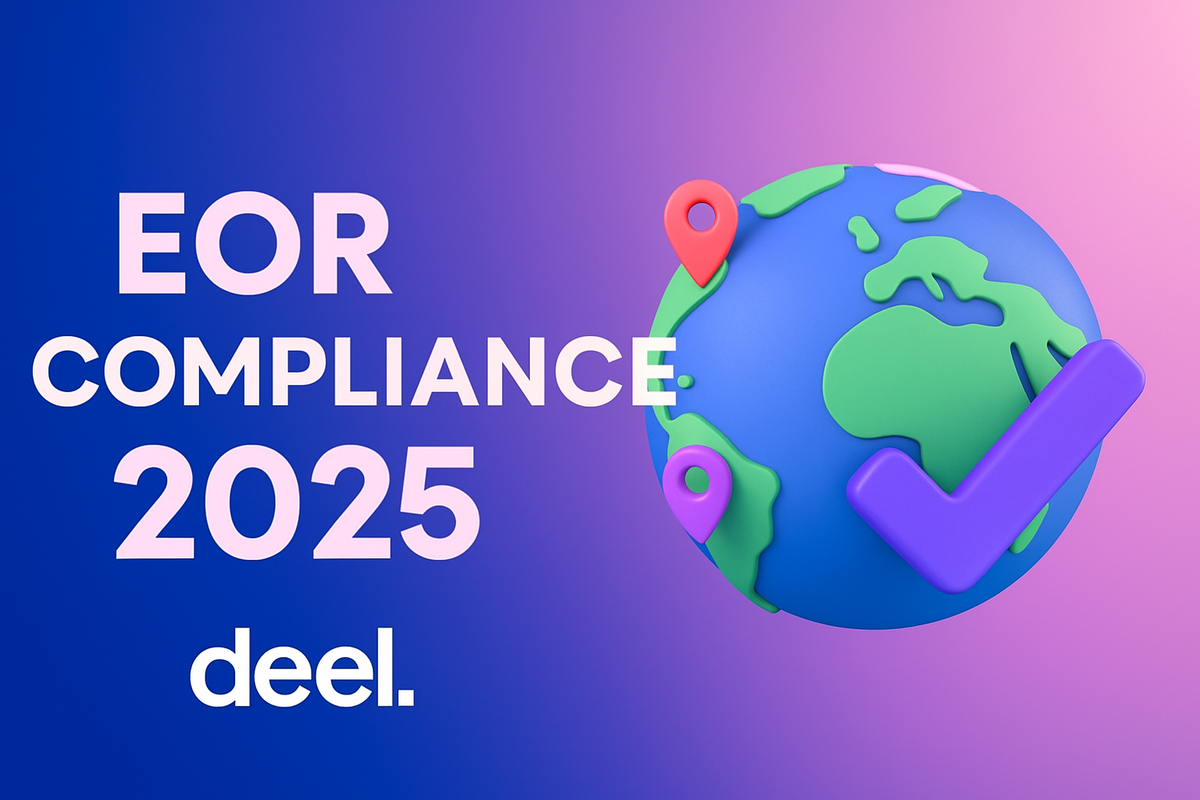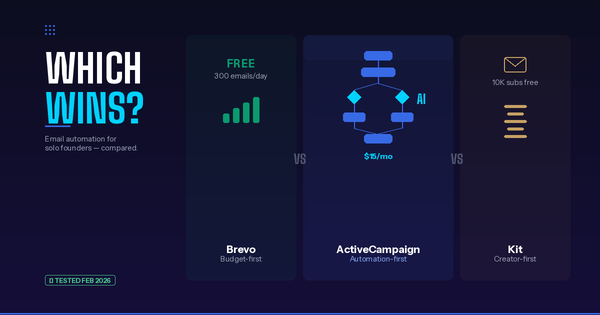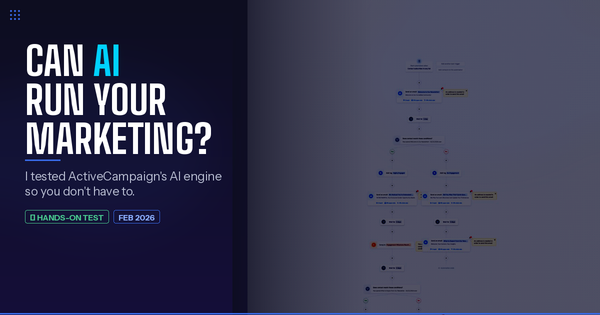The 2025 Global EOR Compliance Checklist: 15 Rules You Can’t Afford to Miss (Backed by Deel Data)
Stay ahead of international labor laws with this essential 2025 checklist—plus how Deel keeps your global team compliant, secure, and audit-ready

As global hiring accelerates, compliance is becoming more complex than ever. Deel’s State of Global Hiring Report shows contract volumes are up nearly 40% year-over-year, with companies now hiring in over 150 countries. But each new hire brings new legal obligations—across labor laws, taxes, payroll, and benefits.
This 15-point EOR compliance checklist for 2025 is built for HR, payroll, and legal teams managing international hires. It includes key regulations, recent legal changes, and how Deel’s platform automates the hardest parts.
1. Classify Workers Correctly
Misclassifying a contractor as an employee—or vice versa—can lead to major fines and back taxes.
- The EU’s Platform Work Directive allows fines of up to €200,000.
- The UAE and US are tightening rules around gig workers.
- Deel’s solution: Its built-in Worker Classifier uses real case law to flag classification risks in over 15 countries.
2. Use Locally Compliant Employment Contracts
Each country requires different clauses, formats, and languages in employment contracts.
- Required elements: salary, notice period, working hours, entitlements.
- Deel’s solution: Auto-generates compliant contracts and reissues updates via its Compliance Hub when laws change.
3. File and Pay Local Payroll Taxes
Employers must calculate, withhold, and remit income tax, social security, and other levies accurately and on time.
- Errors lead to audits and fines.
- Deel’s solution: Handles tax filings and payments across 150+ countries—and assumes liability for any errors.
4. Pay Mandatory Social Contributions
Most countries require employers to fund public pensions, healthcare, and other insurance.
- Examples:
- India: 12 % EPF
- Brazil: 8 % FGTS monthly contribution
- Singapore: Up to 17 % CPF
- Australia: Superannuation rate rises to 12 % by July 2025
- Deel’s solution: Automates all required contributions based on local rules.
5. Meet Minimum Wage and Equal Pay Standards
Pay must comply with local minimums and fair compensation laws.
- Germany’s minimum wage: €12.82, possibly increasing in 2025.
- Deel’s solution: Enforces local wage floors during contract setup.
6. Monitor Working Hours and Overtime
Most countries limit weekly hours and mandate premium overtime pay.
- Brazil: > 44 hours/week → 150 % overtime, 200 % on holidays.
- Deel’s solution: Time-tracking integrations calculate overtime correctly.
7. Comply with Paid Leave Regulations
Employers must offer statutory vacation, sick, parental, and holiday leave.
- Brazil: 30 days vacation + ⅓ salary bonus; non-compliance triggers double pay.
- Deel’s solution: Tracks and pays leave entitlements automatically.
8. Follow Legal Termination and Severance Procedures
Terminating an employee requires correct notice and severance pay based on tenure and local law.
- Improper dismissals can lead to lawsuits or reinstatement.
- Deel’s solution: Calculates severance, notice periods, and handles exit paperwork per local law.
9. Comply with Data Privacy Laws
Cross-border hiring involves sensitive employee data. Employers must comply with GDPR and similar laws.
- Deel’s solution: ISO 27001 & SOC-certified, with GDPR-ready data practices and consent management.
10. Secure Work Visas or Permits Where Required
Hiring internationally requires valid right-to-work status.
- UAE’s Virtual Work Visa supports remote hiring legally.
- Deel’s solution: Provides full visa and immigration support for remote or relocated employees.
11. Manage Permanent Establishment (PE) Risk
Hiring abroad can trigger local business taxes if staff generate revenue or sign deals.
- Deel’s solution: EOR structure helps minimize PE exposure by acting as the legal employer.
12. Pay Locally and On Time
Salaries must be paid in local currency on the legal schedule.
- Examples:
- Argentina: monthly in ARS
- UAE: within 10 days after month-end
- Deel’s solution: Pays in 150+ currencies and issues localized payslips.
13. Keep Up with Regulatory Changes
Labor laws evolve constantly—companies must adapt quickly.
- Deel’s solution: Real-time alerts from the Compliance Hub track wage, tax, and benefits changes across 150 countries.
14. Ensure Your EOR Takes Legal Responsibility
Not all EORs assume liability. You need a provider that absorbs risk for tax and compliance errors.
15. Handle Equity and Bonuses Legally
Equity grants are often taxed as regular income for EOR employees.
- Be aware of upfront taxation and local payroll rules.
- Deel’s solution: Offers equity consulting and tax-compliant structures per country.
Key Compliance Changes in 2025
| Country | What’s Changing | Checklist Rule |
|---|---|---|
| Germany | Minimum wage may increase to €15 | Rule 5 |
| Australia | Superannuation reaches 12 % on 1 July | Rule 4 |
| Singapore | CPF rates rise for employees aged 55+ | Rule 4 |
Downloadable Resources
- Printable 15-Point PDF Checklist
- Country-by-Country Compliance Table
- Deel Hiring Trends Graphs
Add these behind a simple lead form to collect contacts from HR, finance, and legal teams.
Frequently Asked Questions (FAQ)
1. Does hiring through an EOR remove permanent establishment (PE) risk?
No, but it significantly reduces it. PE can still occur depending on your team’s activities.
2. Who pays fines if payroll taxes are filed late?
With Deel, the company is not liable. As the legal employer, Deel covers penalties.
3. How often is compliance data updated?
Deel’s Compliance Hub updates in real time, tracking over 150 countries.
4. Can I grant stock options to international EOR employees?
Yes, but expect them to be taxed as income. Deel’s equity consultants can guide you.
5. What’s the most common compliance mistake?
Worker misclassification—especially contractors incorrectly treated as employees—remains the top risk globally.
Final Thoughts
Hiring globally in 2025 is a competitive advantage—but only if you stay compliant. Use this checklist to avoid fines, legal risks, and HR headaches. Deel’s all-in-one platform can help you onboard, pay, and manage workers in 150+ countries—safely and legally.





